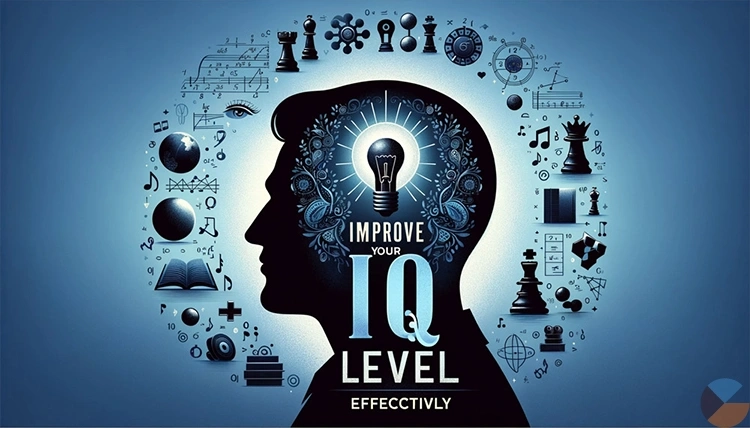IQ Improvement: Unlocking Your Full Intellectual Potential
In a world where intellectual abilities are highly valued, many people aspire to boost their IQ (Intelligence Quotient) to achieve greater success in various aspects of life. IQ improvement is not just about enhancing your cognitive abilities but also about maximizing your overall potential. While genetics play a role in determining your IQ, numerous strategies can help you enhance it. In this article, we will explore various methods and techniques for IQ improvement, covering everything from lifestyle changes to mental exercises.
Understanding IQ and Its Importance
Before diving into IQ improvement strategies, it's essential to understand what IQ is and why it matters. IQ is a measure of a person's cognitive abilities, such as logical reasoning, problem-solving, and critical thinking. It is often used as an indicator of intelligence, although it's important to note that intelligence is multifaceted and cannot be fully captured by a single number.
The significance of IQ lies in its correlation with various life outcomes. Higher IQ scores are often associated with better academic performance, career success, and problem-solving abilities. However, it's crucial to remember that IQ is not the only determinant of success; emotional intelligence, creativity, and social skills also play vital roles.
The Science Behind IQ Improvement
The concept of IQ improvement has been a topic of debate among scientists for decades. While the idea that IQ is entirely fixed has been largely debunked, it's also clear that IQ improvement is not a straightforward process. Intelligence is influenced by a combination of genetic and environmental factors. However, research has shown that certain interventions and practices can lead to cognitive enhancement and, subsequently, IQ improvement.
1. Adopt a Brain-Healthy Diet
One of the fundamental pillars of IQ improvement is maintaining a brain-healthy diet. What you eat has a direct impact on your cognitive functions. A diet rich in essential nutrients can boost brainpower and contribute to IQ improvement.
Omega-3 Fatty Acids: Found in fish like salmon, walnuts, and flaxseeds, omega-3 fatty acids are known for their neuroprotective properties. They help in the formation of brain cell membranes and promote communication between brain cells.
Antioxidants: Foods like berries, dark chocolate, and green tea are packed with antioxidants that protect the brain from oxidative stress. This protection is crucial for maintaining cognitive health and IQ improvement.
Complex Carbohydrates: Whole grains, fruits, and vegetables provide a steady supply of glucose to the brain, ensuring consistent energy levels. This steady energy supply is essential for optimal brain function and IQ improvement.
Vitamins and Minerals: Ensure your diet includes vitamins like B-complex, C, and D, as well as minerals like magnesium and zinc. These nutrients support cognitive functions and contribute to IQ improvement.
2. Engage in Regular Physical Exercise
Physical exercise is not only beneficial for your body but also for your brain. Regular exercise has been linked to improved cognitive function and IQ improvement. Here's how exercise contributes to a sharper mind:
Increased Blood Flow to the Brain: Exercise increases blood flow to the brain, providing it with more oxygen and nutrients. This enhanced blood flow supports brain cell growth and enhances cognitive abilities.
Neurogenesis: Physical activity promotes the growth of new neurons in the hippocampus, a region of the brain associated with memory and learning. This neurogenesis is a key factor in IQ improvement.
Stress Reduction: Exercise reduces stress and anxiety, both of which can negatively impact cognitive performance. Lower stress levels contribute to better focus and mental clarity, aiding in IQ improvement.
3. Prioritize Quality Sleep
Sleep is often underestimated when it comes to cognitive health. However, it plays a crucial role in IQ improvement. During sleep, the brain consolidates memories, clears toxins, and rejuvenates itself for the next day.
Memory Consolidation: Sleep helps solidify memories and improve recall. A well-rested brain is better equipped to process information, leading to enhanced cognitive abilities and IQ improvement.
Cognitive Restoration: During deep sleep, the brain undergoes restoration processes, repairing damaged cells and replenishing energy stores. This restoration is essential for maintaining cognitive functions and supporting IQ improvement.
Emotional Regulation: Adequate sleep is linked to better emotional regulation, which in turn enhances decision-making and problem-solving skills, both of which are crucial for IQ improvement.
4. Engage in Brain-Training Exercises
Just as physical exercise strengthens the body, mental exercises can enhance cognitive abilities and contribute to IQ improvement. Engaging in activities that challenge your brain can help you develop critical thinking, problem-solving, and memory skills.
Puzzles and Games: Activities like crossword puzzles, Sudoku, and chess stimulate different areas of the brain, improving cognitive flexibility and problem-solving skills. These exercises are excellent tools for IQ improvement.
Learning New Skills: Taking up new hobbies or learning a new language challenges the brain to adapt and form new neural connections. This continuous learning process is a powerful driver of IQ improvement.
Memory Training: Practicing memory techniques, such as mnemonic devices or the method of loci, can enhance your ability to retain and recall information. Improved memory contributes to overall IQ improvement.
5. Cultivate a Growth Mindset
Your mindset plays a significant role in IQ improvement. A growth mindset, the belief that intelligence can be developed through effort and learning, is essential for maximizing your cognitive potential.
Embrace Challenges: Instead of avoiding difficult tasks, view them as opportunities for growth. Tackling challenges head-on fosters resilience and problem-solving skills, both of which are vital for IQ improvement.
Learn from Failures: Treat failures as learning experiences rather than setbacks. Reflecting on mistakes and seeking ways to improve enhances cognitive abilities and supports IQ improvement.
Stay Curious: Cultivate a lifelong curiosity for learning. Being curious and open to new experiences keeps your brain engaged and contributes to continuous IQ improvement.
6. Practice Mindfulness and Meditation
Mindfulness and meditation have gained popularity for their ability to improve mental well-being, but they also have a positive impact on cognitive function and IQ improvement. These practices help you develop better focus, clarity, and emotional regulation.
Improved Focus: Mindfulness exercises, such as focusing on your breath or body sensations, train your brain to maintain attention and avoid distractions. Improved focus is a key component of IQ improvement.
Stress Reduction: Mindfulness and meditation reduce stress, which can impair cognitive functions. Lower stress levels enhance your ability to think clearly and make sound decisions, aiding in IQ improvement.
Enhanced Emotional Intelligence: Mindfulness practices improve emotional awareness and regulation, leading to better interpersonal relationships and decision-making skills. Emotional intelligence is closely linked to IQ improvement.
7. Read Regularly and Broadly
Reading is one of the most effective ways to stimulate the brain and promote IQ improvement. It exposes you to new ideas, perspectives, and knowledge, all of which contribute to cognitive development.
Expanding Vocabulary: Reading regularly helps you expand your vocabulary and improve your language skills. A rich vocabulary enhances communication and comprehension, both of which are essential for IQ improvement.
Critical Thinking: Engaging with complex texts and analyzing arguments sharpens your critical thinking skills. The ability to think critically and evaluate information is a cornerstone of IQ improvement.
General Knowledge: Reading a wide range of subjects broadens your knowledge base and makes you more informed. A well-informed mind is better equipped to make connections between different concepts, supporting IQ improvement.
8. Stay Socially Active
Human beings are social creatures, and social interactions play a significant role in cognitive development and IQ improvement. Engaging in meaningful conversations and maintaining strong relationships can stimulate your brain and enhance your intellectual abilities.
Communication Skills: Regular social interactions help you develop and refine your communication skills. Effective communication is crucial for conveying ideas and solving problems, contributing to IQ improvement.
Emotional Intelligence: Socializing with others enhances your emotional intelligence, enabling you to navigate complex social situations and make better decisions. Emotional intelligence is a key component of overall intelligence and IQ improvement.
Learning from Others: Interacting with people from diverse backgrounds exposes you to different perspectives and ideas. This exchange of knowledge and experiences fosters cognitive flexibility and supports IQ improvement.
9. Limit Screen Time and Digital Distractions
In the digital age, excessive screen time and constant exposure to digital distractions can hinder cognitive function and impede IQ improvement. It's essential to strike a balance between screen time and other mentally stimulating activities.
Digital Detox: Taking regular breaks from screens allows your brain to rest and recharge. A digital detox can help improve focus, memory, and overall cognitive function, aiding in IQ improvement.
Mindful Technology Use: Use technology mindfully by setting limits on screen time and choosing content that stimulates your mind. Engaging with educational content, for example, can contribute to IQ improvement.
Avoid Multitasking: Multitasking, especially with digital devices, can reduce cognitive performance and make it harder to focus. Instead, focus on one task at a time to enhance concentration and support IQ improvement.
10. Seek Continuous Learning Opportunities
Lifelong learning is a powerful tool for IQ improvement. Continuously seeking new knowledge and skills keeps your brain active and adaptable.
Formal Education: Pursuing higher education or enrolling in courses related to your interests can enhance your knowledge and cognitive abilities. Formal education is a structured way to promote IQ improvement.
Informal Learning: Learning doesn't always have to take place in a classroom. Informal learning, such as attending workshops, reading books, or watching educational videos, also contributes to IQ improvement.
Creative Pursuits: Engaging in creative activities, such as writing, painting, or playing a musical instrument, stimulates different areas of the brain and encourages cognitive flexibility. Creativity is closely linked to IQ improvement.
Conclusion: Embrace the Journey of IQ Improvement
IQ improvement is not an overnight process; it requires dedication, consistency, and a willingness to challenge yourself. By adopting a brain-healthy diet, engaging in regular physical exercise, prioritizing sleep, and practicing mindfulness, you can enhance your cognitive abilities and boost your IQ. Additionally, staying socially active, limiting screen time, and seeking continuous learning opportunities will further support your journey toward IQ improvement.
Remember that intelligence is not solely determined by genetics. Your environment, lifestyle choices, and mindset play a significant role in shaping your cognitive abilities. By incorporating the strategies outlined in this article, you can unlock your full intellectual potential and achieve lasting IQ improvement. Embrace the journey, stay curious, and continue to strive for mental excellence.









 Ingning
Ingning







